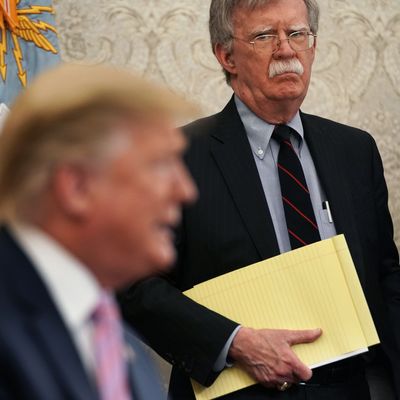
“If you could show me that Trump actually was engaging in a quid pro quo, outside the phone call,” pronounced Lindsey Graham last fall, “that would be very disturbing.” Fox News host Steve Doocy actually went even farther. “If the president said, ‘I will give you the money, but you have got to investigate Joe Biden,’” he said, “that is really off-the-rails wrong. But if it’s something else, you know, it would be nice to know what it is.”
We now know it is not, in fact, something else. It is very clear that the revelations produced during the time have had an important — indeed, transformative — impact on the thinking of many party members. Many Republicans started the process believing 1) President Trump did not demand investigation in return for aid but that 2) doing so would be unacceptable. They now believe the opposite on both points.
You would think that, given the profound effect the evidence of the case has had upon their stance, Republicans would be eager to learn even more. Yet oddly they remain indifferent, or even hostile, to further revelations.
The most fascinating journey of discovery has been that of The Wall Street Journal editorial page. The Journal editorializes today that John Bolton’s reported claim that he personally witnessed Trump ordering a quid pro quo between military aid and investigations merely confirms what everybody already knows. “The report that John Bolton’s book draft implicates President Trump more closely to ordering a delay in military aid to Ukraine is hardly a surprise and won’t — and shouldn’t — change the impeachment result.”
And yet this news might indeed surprise anybody who had been foolish enough to rely on the Journal’s editorial line. When the transcript of Trump’s phone call with Ukrainian President Zelensky first came out, the Journal takeaway was “No quid pro quo. The references to the Bidens are in the context of fighting corruption, not as a prerequisite of U.S. aid.”
In November, Gordon Sondland testified that everybody was in the loop about the quid pro quo, the Journal’s editors remained unconvinced. “The impeachment press is hyperventilating that Mr. Sondland finally nailed down the elusive quid pro quo with Ukraine, but that is far from clear…” they argued, “note that Mr. Sondland says nothing about aid to Ukraine being part of the quid, and under questioning later he said he merely ‘presumed’ there were preconditions for a Trump-Zelensky meeting. He never heard that directly from Mr. Trump, and on one call with Mr. Sondland the President flatly rejected the idea.” And then when Democrats unveiled articles of impeachment the next month, the Journal seemed to see a quid pro quo as having been debunked: “They don’t even pretend any more to prove a quid pro quo.”
The Journal has described all these developments as a series of dull, overhyped, nothing-to-see-here claims. The headlines of the editorials quoted above are, respectively, “The Ukraine Transcript Fizzle”; “Sondland’s Unimpeachable Offenses”; and “The Incredible Shrinking Impeachment.” Somehow, though, even as the Journal’s editors have struggled to stay awake through the newsless tedium, they have managed to reverse their understanding of the facts 180 degrees. The quid pro quo allegation has gone from damnable lie to something everybody knew all along.
The impeachment process has inspired large segments of the Republican party to transform its view of what Trump did with Ukraine, and what is acceptable. They have opposed every step of the investigations that produced these revelations, even as they discovered so much about their own thinking. Perhaps their aversion to new evidence stems not from certainty they will learn nothing, but a fear as to what new thing they will discover they must now defend.






























